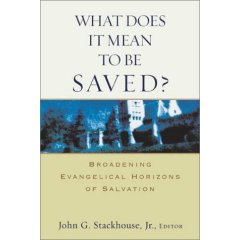Book Note: What Does It Mean to BE Saved? John Stackhouse
Author: Bobby Valentine | Filed under: Books, Christian hope, eschatology, Exegesis, Hermeneutics, Ministry, Mission, Preaching, resurrection
BOOK NOTE: What Does It Mean to Be Saved?
Several years ago (2002) I happened upon an interesting title. It was a volume edited by John Stackhouse, Jr a prof at Regent College in Canada. The title was What Does it Mean to Be Saved?: Broadening Evangelical Horizons of Salvation (Baker Academic 2002). Seeing a number of scholars whose work I had come to value (especially Rikki Watts and Jonathan Wilson) I picked it up.
The title also intrigued me because I had grown increasingly unsatisfied with how most Restorations and Evangelicals were basically “salvation minimalists.” That is the only dimension that they either understood or perhaps believed was what might be called “personal” salvation. Indeed for many years I had done this as well.
I am convinced that this minimalist approach to salvation has also had profound effects on the contemporary discipleship of Christians. I believe that one reason why Christians both look like and act like unredeemed humanity is directly related to this individualistic transactional approach to salvation.
Thus this book is a welcome and needed exploration of the contours of the biblical dimensions of salvation. Rikki Watts (whose book Isaiah’s New Exodus in Mark is incredibly rich) explores the theology of salvation as a new exodus and restoration of creation; Vincent Bacote argues that salvation has important implications for “This Life,” and other outstanding essays.
As a chastened Restorationist, it has been to my delight that key figures in the Stone-Campbell Movement essentially bought into this type of theology. Alexander Campbell’s essay on “Regeneration” is eye opening for those who are hypercritical of him. Robert Milligan in his classic Scheme of Redemption has a satisfyingly biblical approach to salvation as wholeness and restoration of God’s creation. David Lipscomb and James A. Harding both held to a deeper and more biblical new creationist eschatology which is explored to some extent in my new book with John Mark Hicks, Kingdom Come.
For those interested in exploring the wider dimensions of the biblical doctrine of salvation this may be a good book to digest. I believe it will be worth the effort.
Shalom,
Stoned-Campbell Disciple
May 20th, 2006 at 8:15 pm
BV – I would like to see you comment further on the implications of individualistic salvation. Is this a phenomenon that celebrates the achievement of the individual in permitting the LORD to save him or her because they believed all the right things and responded in all the right ways? Thus, in reality, creating a person who has reinvented himself/herself spiritually?
Or, is salvation so radical, it is not any sort of “claim” placed upon God, but a realization that grace means salvation is a process/event only the LORD can achieve for us? An event we enter into by faith and “faith alone”? I trust you get my meaning, for no doubt this phrase “faith alone” will be misunderstood as it has been for centuries.
Bob Hendren, Florence, AL
May 22nd, 2006 at 3:36 pm
Looks good, Bobby. I will probably pick up a copy.
I have been furiously writing on this subject for some time. I hope to add a theological dimension to my web site soon with some of these documents.
Peace.
May 22nd, 2006 at 7:27 pm
Bob,
Thanks for being a stimulating dialog partner. I lean towards the second paragraph. “Salvation” is completly radical and is by “faith alone” in the Pauline sense. (James is, in my view, an abused text).
Salvation however moves far beyond the removal of sins to a restoration of wholeness or shalom. This salvation is individual in that it includes you and I but it is communal and cosmic.
It is process because even though we “are” saved we also groan with creation for the redemption of our bodies (cf. Romans 8). We experience salvation may be like that of the Holy Spirit . . . as a first fruit. The initial down payment waiting for the rest of the glorious harvest. If that is the case then what a glorious future awaits us.
Shalom,
Bobby Valentine